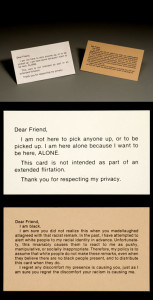Fall Texts
Women’s Diasporic Literature:
– No Telephone to Heaven, Michelle Cliff (1987)
– The Dew Breaker, Edwidge Danticat (2004)
– Sula, Toni Morrison (1973)
– Citizen: An American Lyric, Claudia Rankine (2014)
+ Short Stories and Essays
Weird Fictions
– Kindred, Octavia Butler (1979)
Butler’s obituary
– Never Let Me Go, Kazuo Ishiguro (2005)
Something about Kathy…
– Pedro Páramo, Juan Rulfo (1955)
The Ghosts of Comala
– Dracula, Bram Stoker (1897)
The Evolution of Vampires
+ Short Stories, Essays and films
From Ghostly Matters: Haunting and the Sociological lmagination
“How do we reckon with what modern history has rendered ghostly?”
—Avery F. Gordon, Ghostly Matters: Haunting and the Sociological lmagination
Gordon explains that “[t]he ghost is not simply a dead or missing person, but a social figure, and investigating it can lead to that dense site where history and subjectivity make social life. The ghost or the apparition is one form by which something lost, or barely visible, or seemingly not there to our supposedly well-trained eyes, makes itself known or apparent to us.” Most importantly, seeing ghosts gives us the experience of being haunted, and “haunting is a very particular way of knowing what has happened or is happening. Being haunted draws us affectively, sometimes against our will and always a bit magically, into the structure of feeling of a reality we come to experience, not as cold knowledge, but as transformative recognition.” (8)
My Calling(Card) #1, 1986
Imre Kertész and the Nobel Lecture
“Whereas I, on a lovely spring day in 1955, suddenly came to the realization that there exists only one reality, and that is me, my own life, this fragile gift bestowed for an uncertain time, which had been seized, expropriated by alien forces, and circumscribed, marked up, branded – and which I had to take back from “History”, this dreadful Moloch, because it was mine and mine alone, and I had to manage it accordingly.”
“If the world is an objective reality that exists independently of us, then humans themselves, even in their own eyes, are nothing more than objects, and their life stories merely a series of disconnected historical accidents, which they may wonder at, but which they themselves have nothing to do with. It would make no sense to arrange the fragments in a coherent whole, because some of it may be far too objective for the subjective Self to be held responsible for it.”
This Nettle…
“We all attempt to live on the surface, where we assume we will be less lonely, whereas experience is of the depths and is dictated by what we really fear and hate and love as distinguished from what we think we ought to fear and hate and love.”
“This Nettle, Danger…,” 687
Guilt
“I’m not interested in anybody’s guilt. Guilt is a luxury that we can no longer afford. I know you didn’t do it, and I didn’t do it either, but I am responsible for it because I am a man and a citizen of this country and you are responsible for it, too, for the very same reason: As long as my children face the future they face, and come to the ruin that they come to, your children are very greatly in danger, too. They are endangered above all by the moral apathy that pretends it isn’t happening. This does something terrible to us.”
– “Words of a Native Son,” 707
Claudia Rankine
I just read Citizen: An American Lyric and I was struck by the urgency with which it touched me, made me want to handle it, read it again as if I had never experienced her words. There was so much truth in this book that, for a moment, I didn’t understand that it was not written just for me.
Not long ago you are in a room where someone asks the philosopher Judith Butler what makes language hurtful. You can feel everyone lean in. Our very being exposes us to the address of another, she answers. We suffer from the condition of being addressable.
—
For so long I thought the ambition of racist language was to denigrate and erase me as a person, but after considering Butler’s remarks I begin to understand myself as rendered hyper-visible in the face of such language acts. Language that feels hurtful is intended to exploit all the ways that I am present. My alertness, my openness, my desire to engage my colleague’s poem, my colleague’s words, actually demands my presence, my looking back at him. So here I am looking back, talking back and, as insane as it is, saying, please.
(Page numbers forthcoming)
Beyond Black
Hilary Mantel, when describing how she writes, refers to a passage near the beginning of her earlier novel Beyond Black, about a performing medium, Alison:
She takes a breath, she smiles, and she starts a peculiar form of listening. It is a silent sensory ascent; it is like listening from a stepladder, poised on the top rung; she listens at the ends of her nerves, at the limit of her capacities. When you’re doing platform work, it’s rare that the dead need coaxing. The skill is in isolating the voices, picking out one and letting the others recede.
Black Politics, Public Intellect and Rigor
From Robin D.G. Kelley:
I don’t play pundit because I’m not interested in ‘influencing popular opinion’ if it means sacrificing analytical rigor. Our job as intellectuals is to ask the hard questions, interrogate inherited categories, take nothing as self-evident, and go to the root of the problem. That includes the work of addressing contemporary social crises. I’m concerned that if we persist in conflating relevance with popular, the form, or rather the forum, will become our main concern.
Thoughts?
